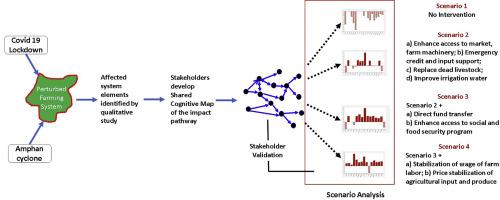Agricultural Systems ( IF 6.6 ) Pub Date : 2021-01-19 , DOI: 10.1016/j.agsy.2021.103051 Rupak Goswami 1 , Kalyan Roy 1 , Sudarshan Dutta 2, 3 , Krishnendu Ray 4 , Sukamal Sarkar 5 , Koushik Brahmachari 5 , Manoj Kr Nanda 5 , Mohammed Mainuddin 6 , Hirak Banerjee 5 , Jagadish Timsina 7 , Kaushik Majumdar 2, 3

|
The shock of Coronavirus Disease 2019 (COVID-19) has disrupted food systems worldwide. Such disruption, affecting multiple systems interfaces in smallholder agriculture, is unprecedented and needs to be understood from multi-stakeholder perspectives. The multiple loops of causality in the pathways of impact renders the system outcomes unpredictable. Understanding the nature of such unpredictable pathways is critical to identify present and future systems intervention strategies. Our study aims to explore the multiple pathways of present and future impact created by the pandemic and “Amphan” cyclonic storm on smallholder agricultural systems. Also, we anticipate the behaviour of the systems elements under different realistic scenarios of intervention. We explored the severity and multi-faceted impacts of the pandemic on vulnerable smallholder agricultural production systems through in-depth interactions with key players at the micro-level. It provided contextual information, and revealed critical insights to understand the cascading effect of the pandemic and the cyclone on farm households. We employed thematic analysis of in-depth interviews with multiple stakeholders in Sundarbans areas in eastern India, to identify the present and future systems outcomes caused by the pandemic, and later compounded by “Amphan”. The immediate adaptation strategies of the farmers were engaging family labors, exchanging labors with neighbouring farmers, borrowing money from relatives, accessing free food rations, replacing dead livestock, early harvesting, and reclamation of waterbodies. The thematic analysis identified several systems elements, such as harvesting, marketing, labor accessibility, among others, through which the impacts of the pandemic were expressed. Drawing on these outputs, we employed Mental Modeler, a Fuzzy-Logic Cognitive Mapping tool, to develop multi-stakeholder mental models for the smallholder agricultural systems of the region. Analysis of the mental models indicated the centrality of “Kharif” (monsoon) rice production, current farm income, and investment for the next crop cycle to determine the pathways and degree of the dual impact on farm households. Current household expenditure, livestock, and soil fertility were other central elements in the shared mental model. Scenario analysis with multiple stakeholders suggested enhanced market access and current household income, sustained investment in farming, rapid improvement in affected soil, irrigation water and livestock as the most effective strategies to enhance the resilience of farm families during and after the pandemic. This study may help in formulating short and long-term intervention strategies in the post-pandemic communities, and the methodological approach can be used elsewhere to understand perturbed socioecological systems to formulate anticipatory intervention strategies based on collective wisdom of stakeholders.
中文翻译:

COVID-19 对小农农业系统的多方面影响和结果:整合定性研究和模糊认知映射以探索弹性策略
2019 年冠状病毒病 (COVID-19) 的冲击扰乱了全球粮食系统。这种影响小农农业多个系统接口的破坏是前所未有的,需要从多利益相关者的角度来理解。影响路径中的多重因果循环使系统结果不可预测。了解这种不可预测途径的性质对于确定当前和未来的系统干预策略至关重要。我们的研究旨在探索大流行病和“Amphan”气旋风暴对小农农业系统造成的当前和未来影响的多种途径。此外,我们预计系统元素在不同的现实干预场景下的行为。通过与微观层面的主要参与者的深入互动,我们探讨了大流行病对脆弱的小农农业生产系统的严重性和多方面影响。它提供了背景信息,并揭示了重要的见解,以了解大流行病和飓风对农户的级联效应。我们对印度东部孙德尔本斯地区的多个利益相关者进行了深入访谈,并进行了专题分析,以确定由大流行病以及后来因“Amphan”而加剧的当前和未来系统结果。农民的直接适应策略是让家庭劳动力、与邻近农民交换劳动力、向亲戚借钱、获得免费口粮、更换死牲畜、早期收获和开垦水体。专题分析确定了几个系统要素,例如收获、营销、劳动力可及性等,通过这些要素表达了大流行的影响。根据这些输出,我们采用心智模型师,一种模糊逻辑认知映射工具,用于为该地区的小农农业系统开发多方利益相关者心智模型。心智模型分析表明“Kharif”(季风)水稻生产、当前农场收入和下一个作物周期投资的中心地位,以确定对农户的双重影响的途径和程度。当前的家庭支出、牲畜和土壤肥力是共享心智模型中的其他核心要素。与多个利益相关者进行的情景分析表明,加强市场准入和当前家庭收入、持续投资农业、快速改善受影响的土壤、灌溉水和牲畜是在大流行期间和之后增强农户恢复力的最有效策略。


























 京公网安备 11010802027423号
京公网安备 11010802027423号